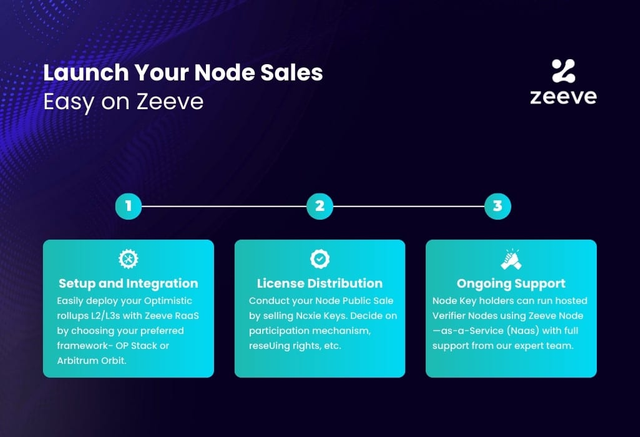
Zeeve is expanding its rollups-as-a-service (RaaS) offering with an advanced node sale launchpad for the node sale infrastructure. All kinds of optimistic rollup projects seeking to add an additional security and monitoring layer can leverage the Launchpad service to implement a robust verifier node system in their ecosystem. And, with that, web3 projects can create new paths for enhanced security, additional token utility and funding options. Let’s dive deeper to understand more about Zeeve’s Verifier node sale launchpad also while briefing verifier nodes, the node sale process, and the projects that have announced verifier node sale.
What exactly are verifier nodes?
Verifier nodes, also sometimes called checker or sentry nodes, refer to an additional standalone component responsible for maintaining security and robustness for Layer2 optimistic rollups. Instead of assuming the transactions to be valid after the challenge period, you can actually appoint honest third-party screeners who will proactively monitor the entire on-chain operations and ensure there are no errors or malicious activities that potentially hamper security and decentralization.

Projects are free to set criteria for operators interested in running verifier nodes. For example, the staking requirement can differ, hardware requirements can be distinct, etc. With everything in place, you can simply sell node licenses to the node operators so that they can set up and run nodes on their system. However, rollups first need to add a verifier node layer into their protocol, which can be complex. And that’s where Zeeve’s verifier node sale infrastructure helps. We will learn more about this later in the article.
Why are more L2/L3 rollups opting for node sales?
Following are some of the top benefits that Layer2/ Layer3 Optimistic rollups can leverage through verifier nodes:
The most important role of verifier nodes is to act as a powerful, unbiased screener for the rollup transactions, ensuring security compliance and standards at each network layer. Note that verifier nodes do more than just detect fraudulent activities. They are optimized to achieve significant enforcement against misbehaving nodes and protect users’ sensitive data. Due to their decentralized structure, verifier nodes eliminate challenges like single points of failure to achieve greater reliability.
Adding more utility to native tokens can be a challenge for independent Rollups. That’s because tokenomics in L2/L3s are not as mature as established layer1 blockchains. Through verifier nodes, networks allow node operators to lock/stake their tokens, pay a transaction fee in the native token, and receive an incentive in the same native token for their contribution to ensuring security and decentralization. This way, rollups add significant utility to their token and generate its higher demand.
Getting enough funds is definitely a big challenge for Web3 projects. Now, they have another funding option through verifier nodes. By selling the node license for a continued duration, projects can unlock a solid revenue stream to support the development of their protocol in the long run. A good example of this is HYCHAIN, which raised 8M+ funding through the sale of 16000+ node license keys in just 2 days.
Rollup protocols that want to build their brand and reputation often seek better community engagement. Through verifier nodes, optimistic rollups entail the seamless participation of additional, community-run nodes that promote community engagement without much heavy lifting.
How does the entire node sale process work?
Although new, verifier nodes have started getting traction across rollups due to the tremendous benefits we discussed above. However, we must understand that the implementation of an additional validation system like verifier nodes is not supported natively on optimistic rollups as of now.
Therefore, Layer2 rollup projects need the service offered by RaaS providers. These providers allow rollups to seamlessly add verifier node systems to their ecosystem and sell node licenses to eligible operators. The software for implementing verifier nodes and the node license — both components are essential for node sale, which projects require from their RaaS partner.
Protocols that have announced verifier node sales so far:
Try Zeeve’s verifier node sale launchpad: Super easy way to sell node licenses
Zeeve’s verifier node sale launchpad is designed to serve all kinds of Optimistic rollup chains. For example, L2s built with Arbitrum Orbit or OP Stack can leverage the launchpad service to add a verifier node layer into their protocol and thereby open up the node license for sale.
Essentially, Zeeve provides the set of software needed for the implementation of the verifier node infrastructure into rollups, as well as the node license that node operators will buy to run their verifier nodes.
By doing this, Zeeve streamlines verifier node sales for Optimistic L2/L3s, allowing them to leverage benefits like unparalleled security, easy funding, and additional token utility. Here’s an image showing how you can launch & manage verifier node sales with Zeeve in some simple steps:

As discussed, verifier nodes introduce an innovative concept for enhancing security and decentralization on rollup protocols. Looking forward, we expect a lot of optimistic rollup L2/L3s, especially for the new players, to leverage verifier nodes into their networks. However, for a simple selling approach, they can always use Zeeve’s verifier node sale launchpad. Also, Zeeve offers node-as—a-service (NaaS) for people interested in running, managing, and scaling verifier nodes with the benefits of a fully hosted service. For other RaaS services or blockchain-related offerings at Zeeve, connect with our experts. Mail us your queries or discuss your project requirements in detail on a one-to-one call.